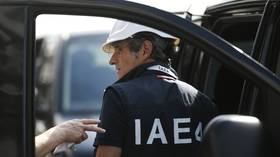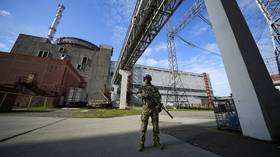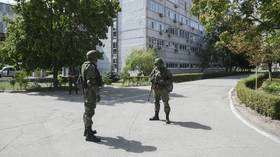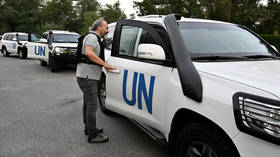It appears that Ukraine planned to use UN-appointed international nuclear experts as a tool for blackmail. The scheme failed
The IAEA report doesn't name the perpetrators of attacks on Europe's biggest nuclear power plant, but the mission itself left Kiev frustrated

If at first you don’t succeed, then try, try again. This seems to be the mantra of the Ukrainian government as it seeks to blackmail the international community into helping it evict Russia from the territory encompassing Europe's largest Nuclear Power Plant.
“The world is once again on the brink of a nuclear disaster,” Kiev's Energy Secretary German Galushchenko declared in a message posted to Facebook on Monday, September 5. “The last line connecting it with the energy system of Ukraine…separated due to the fire that occurred as a result of shelling. Any repair of the lines is impossible now – there are combat operations around the station.”
Galushchenko’s warning came as the bulk of an International Atomic Energy Agency (IAEA) mission, dispatched late last week to inspect the safety of the Zaporozhye facility, and personally led by Director General Rafael Mariano Grossi, departed the nuclear power plant.
Kiev is insisting that the international community oversee the “demilitarization” of the Zaporozhye plant and surrounding environs. The removal of Russian forces, the Ukrainians contend, and their replacement with international “peacekeepers,” is the only way to ensure nuclear safety.
Left unsaid is the fact that all the damage caused to the nuclear power plant is the result of Ukrainian military action, including the deliberate targeting of the nuclear reactors and their support buildings by Ukrainian artillery.
The irony of the Ukrainian action is that IAEA Director General Grossi has now seen first-hand that the threat to the plant comes not from Russia, as Kiev wants to portray, but from Ukraine itself. More damning is that Grossi likewise is cognizant of the reality that Ukraine has been using the IAEA not as a guarantor of nuclear security, but rather a facilitator of Ukrainian policy, including military action that appeared to use the presence of IAEA inspectors at Zaporozhye as cover.
By all appearances, Grossi undertook his mission to the Zaporozhye Nuclear Power Plant in good faith. Since the attacks on the facility started in early August, he has been voicing his concerns and calling on forces on both sides to exercise the “utmost restraint” and avoid jeopardizing the safety of the plant “at all costs.” These calls were echoed by United Nations Secretary-General Antonio Guterres.
In mid-August, at an emergency session of the UN Security Council requested by Russia, Grossi called on Moscow and Kiev allow international experts to visit the power plant, and said he’d lead the mission himself. The United States, while backing his call, also demanded that a demilitarized zone be established in conjunction with any such visit, and said that any refusal by Russia to allow that was tantamount to nuclear blackmail.
Russia refused to consider any requests to “demilitarize” the facility. It did, however, encourage the dispatch of the IAEA team, with one caveat – that it include ballistics specialists who would be able to evaluate the damage done to the plant with an eye toward determining the source of the attacks. Such professionals were included in the mission.
On August 29, Grossi’s team travelled to Kiev, where the next day they met with Ukrainian President Vladimir Zelensky. Zelensky told Grossi that Ukraine believed it was critical for the IAEA to press home its demands for a demilitarized zone, which would enable Ukraine to take control of the plant.
On September 1, Grossi and his team set off for the Zaporozhye facility. Prior to their arrival, they were stopped by Ukrainian officials, who warned Grossi that military activity in and around the facility had picked up that morning. According to Russian military sources, the Ukrainian army had attempted to seize the power plant in a commando raid that was thwarted by Russian forces.
As Grossi’s 14-man team arrived at the power plant, the sound of nearby combat could be readily heard. The deteriorating security situation at the facility prompted Grossi to withdraw the bulk of his team later that day. A six-person sub-team was tasked with remaining on-site for a few days longer, after which four inspectors would depart, leaving behind a two-person element, who would provide a permanent presence, on a rotational basis, at the facility.
Afterwards, Grossi stated that the mission had been valuable. “We knew a lot before too, but of course it is being inspected now. We are trying to do a thorough assessment of the current situation.” As to the security of the plant, Grossi noted that “[t]he physical integrity of the facility has been violated not once, but multiple times. This is by no means acceptable.”
In addition to their personal observations, the team was presented with a petition signed by 20,000 residents from Russia-controlled parts of the Zaporozhye region demanding that the IAEA condemn the attacks on the nuclear power plant, which the signatories said were conducted solely by the Ukrainian forces.
This was not the result either the Ukrainian government or its Western backers could have envisioned when they were pushing for the mission’s dispatch in mid- to late-August.
The IAEA mission, it seems, was not aware that there was going to be a Ukrainian military operation designed to capture the site while the inspectors were en route. There can be no doubt, however, that the Ukrainian government was aware that this was going to happen, even as Zelensky met with Grossi and his team the day before. It is also highly likely that Zelensky’s backers, especially the United States, United Kingdom, and France, were aware of the pending military operation, if not its timing.
Needless to say, using an international inspection team as cover for a military operation is a violation of everything the United Nations Charter stands for. While the goal of the operation appears to have been to capture the site, and then invite the IAEA inspectors to remain there permanently, prompting the need for the dispatch of an international peacekeeping force, this was not achieved.
Worse still for Ukraine and its partners, the team has now been exposed to the duplicity of the Ukrainian government and, by extension, its Western backers in the United Nations, as well as to the reality that Russia had been telling the truth the entire time about the safety and security of the plant. There is no doubt that the ballistic experts accompanying Grossi’s team were able to gather more than enough forensic data to prove conclusively who was responsible for the ongoing attacks on Zaporozhye.
On Tuesday, September 6, Director General Grossi submitted the findings of his mission as part of a larger periodic report on the IAEA’s work in Ukraine since the initiation of Russia’s special military operation. The report is technical in nature, focusing on the safety of the Zaporozhye Nuclear Power Plant. This is the IAEA’s bread and butter, and based upon the contents of the report, the team accurately reflected what it observed while on the ground in Zaporozhye.
A second, unspoken and ultimately more sensitive aspect of the report is the political ramifications of the mission. While accurately reporting the frequency and damage done by repeated artillery strikes on the territory of the plant, Grossi did not provide any conclusions about the origin of the shelling, despite being able to do so based on the data collected by his team. UN organizations, unless specifically mandated to do so, rarely provide attribution when it comes to who did what to whom. Instead, the report concluded that the safety and security of the nuclear power plant and its operators has been put at risk because of the ongoing military action, and encouraged all parties involved to cease such activity.
The report likewise avoids any reference to the efforts of the Russian military to keep the team safe from attack while they were visiting the plant, thereby avoiding any indirect acknowledgement that the threat to Zaporozhye came from Ukraine, not Russia.
What the team did do is speak of “an urgent need for interim measures to prevent a nuclear accident arising from physical damage caused by military means,” which could be achieved by the immediate establishment of a “nuclear safety and security protection zone.” Grossi declared that the “IAEA is ready to start immediately the consultations leading to the urgent establishment of such a nuclear safety and security protection zone at the ZNPP [Zaporozhye Nuclear Power Plant].”
Grossi could have prepared a report that sought the UN Security Council’s condemnation of the perpetrators of the egregious actions observed by the IAEA team – evidence of ongoing Ukrainian artillery attacks, and the use of Grossi’s team as operational cover for a physical attack on the plant while the mission was underway. Grossi is part of the UN system, however, and in any event the Council cannot police itself; when three of the five permanent members are involved in facilitating the Ukrainian malfeasance, then the Council is paralyzed by its own moral corruption.
Regardless, Grossi’s trip is a political defeat for Ukraine and its supporters, which had placed so much hope and effort (including the lives of soldiers who perished in the September 1 assault on Zaporozhye) in using the IAEA inspection as a facilitator for larger objectives, such as the dispatch of international peacekeepers to occupy the plant and its immediate environs.
In a crass display of hubris-laced audacity, Ukraine has called for a new IAEA inspection mission to be accompanied by a UN peacekeeping force. “We need to draw conclusions from this mission {Grossi’s} on the ground,” Peter Kotin, the head of Energoatom, declared on September 5, 2022 – well prior to Grossi’s report being published. “These conclusions should resolve the whole situation by ending Russian control. If the mission does not produce that, then we must have some viable outcome.”
Kotin proposed increasing the number of agency inspectors at the station, adding that “the presence of other international organizations, such as United Nations peacekeeping forces or other international missions from the European Union, will help provide an independent view of what is going on there, and ultimately remove the Russians from the station.”
The chances of that happening are near zero. But the fact that Ukraine continues to push for this outcome virtually guarantees that the relentless shelling of the Zaporozhye plant will continue until such time as the Ukrainian military is pushed back, out of artillery range, or else Ukraine capitulates. In any event, the world will continue to be subjected to nuclear blackmail daily. The perpetrator of this global crime, however, isn’t Russia, but rather Ukraine, along with its Western supporters in the United States, United Kingdom, France, Germany, and elsewhere.
The statements, views and opinions expressed in this column are solely those of the author and do not necessarily represent those of RT.
https://www.rt.com/russia/562307-ukraine-iaea-mission-zaporozhye/





0 Comments:
Post a Comment
Subscribe to Post Comments [Atom]
<< Home